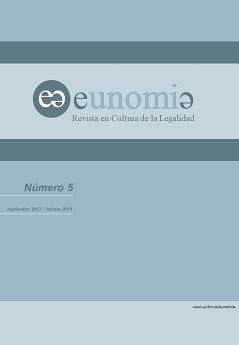Anthropology and Metaphysics in Kant’s Categorical Concept of Law: An interpretation of paragraphs B and C of the Legal Theory
Abstract
Kant searches for the ground of the obligation of moral rules in the field of the pure reason concepts, aiming at a categorical imperative free from empirical contents. This paper challenges this process emphasizing the importance of the anthropological, empirical elements in Kant´s moral philosophy, without affecting the core of his philosophy. To that end, we make a fundamental distinction between moral theory and moral itself. The result is an understanding of moral in which the requirement to have a metaphysically founding to win an a priori pattern doesn´t exclude the anthropological elements, but they rather appear as indispensables.
Downloads
Eunomía. Revista en Cultura de la Legalidad is a duly registered journal, with EISSN 2253-6655.
The articles published in Eunomía are –unless indicated otherwise– under a Creative Commons Attribution-No Derivative Works 3.0 Spain license. You can copy, distribute and communicate them publicly as long as you cite their author and the journal and institution that publishes them and do not make derivative works with them. The full license can be consulted at: http://creativecommons.org/licenses/by-nd/3.0/es/deed.es




